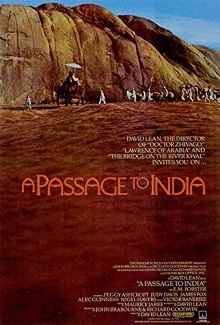
Back A Passage to India (cinta) AN طريق إلى الهند (فيلم) Arabic طريق الى الهند ARZ A Passage to India (película) AST Put u Indiju (film) BS Passatge a l'Índia Catalan A Passage to India Welsh Vejen til Indien Danish Reise nach Indien German Το πέρασμα στην Ινδία Greek
| A Passage to India | |
|---|---|
 Original theatrical poster | |
| Directed by | David Lean |
| Screenplay by | David Lean |
| Based on | |
| Produced by | John Brabourne Richard Goodwin |
| Starring | |
| Cinematography | Ernest Day |
| Edited by | David Lean |
| Music by | Maurice Jarre |
Production companies | |
| Distributed by | Columbia-EMI-Warner Distributors (United Kingdom)[1] Columbia Pictures (United States and Canada) |
Release date |
|
Running time | 163 minutes |
| Countries | United Kingdom United States[2] |
| Language | English |
| Budget | £17 million[3] or $14.5 million[4] |
| Box office | $40 million (est.) |
A Passage to India is a 1984 epic period drama film written, directed and edited by David Lean. The screenplay is based on the 1924 novel of the same name by E. M. Forster and the 1960 play adaptation by Santha Rama Rau. The film stars Peggy Ashcroft, Judy Davis, James Fox, Alec Guinness, Nigel Havers, and Victor Banerjee.
Set in 1920s British India, the film follows the interactions of Dr. Aziz, Mrs. Moore, Adela Quested, Ronny Heaslop, and Richard Fielding in the fictional city of Chandrapore, which is split between the British elite and the native underclass. However, their relationships become strained due to cultural tensions and personal misunderstandings.
This was Lean's final film and marked his return to directing after a 14-year hiatus since Ryan's Daughter (1970). Upon its release, A Passage to India was met with widespread critical acclaim, with some praising it as Lean's finest since Lawrence of Arabia. The film received 11 nominations at the 57th Academy Awards, including Best Picture, Best Director, and Best Actress for Davis. It won Best Supporting Actress for Ashcroft, making her, at 77, the oldest actress to win the award, and Best Original Score for Maurice Jarre, his third award in that category.
- ^ "A Passage to India (1984)". BBFC. Retrieved 22 April 2021.
- ^ "A Passage to India (1984)". British Film Institute. Retrieved 26 March 2024.
- ^ Alexander Walker, Icons in the Fire: The Rise and Fall of Practically Everyone in the British Film Industry 1984–2000, Orion Books (2005), p.35
- ^ MAGNIFICENT OBSESSIONS: Rosenfield, Paul. Los Angeles Times 24 March 1985: 1.